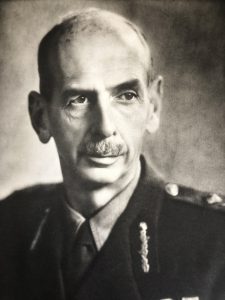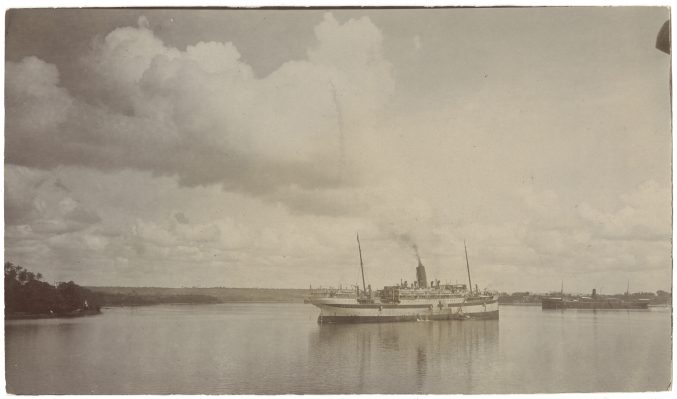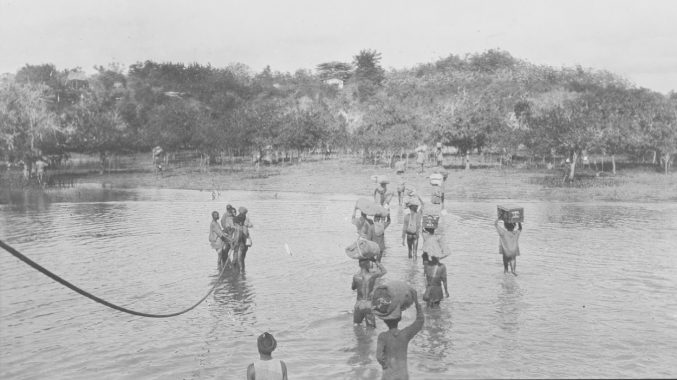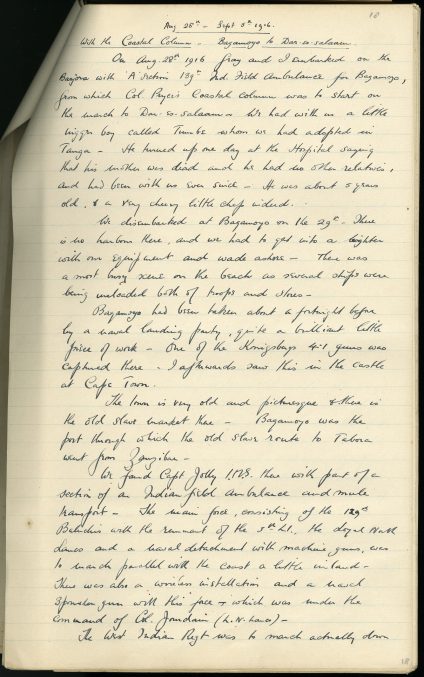“I was lucky enough to escape”: the WW1 diary of Dr Gordon Covell
Posted on by Fay Curtis.

Major-General Sir Gordon Covell in later life. He became a leading global expert on malaria control and eradication.
By Eve Andreski, BECC Documentation Assistant
The British Empire and Commonwealth Collection (BECC) cares for many diaries and letters. These reveal the inner thoughts of people who lived through momentous events. One such person, Dr Gordon Covell, served as a medic with the British Indian Army during WW1. In 1914 he travelled on a ship carrying Indian troops from India to Tanzania, which was then a German colony.
Covell was present for pivotal moments in the East Africa Campaign, including the disastrous first battle of Tanga, and was at Dar-es-salaam when the city surrendered to the British.
His diary provides a snapshot of daily life in wartime. He recounts the hardships which Indian, African and European service members encountered throughout the campaign. He also gives an insight into their complex relationships with local people and each other.
Pages from this diary are currently on display in the We Were Everywhere exhibition at Bristol Museum & Art Gallery. An abridged entry is shared here, and the full transcript is available to read at the exhibition, or digitally on request. We’re very grateful to Mark Small, who transcribed the original diary.
Bagamoyo to Dar-es-salaam
August 28th – September 5th 1916
Tanzania
“Gray [a friend and fellow surgeon] and I embarked on the ship Banjora with the Indian Field Ambulance, destined for Bagamoyo [a harbour town in Tanzania].
We had with us a little boy called Tumbe, whom we had adopted in Tanga. He turned up one day at the Hospital saying that his mother was dead and he had no other relatives, and had been with us ever since. He was about 5 years old, and a very cheery little chap indeed.
We disembarked at Bagamoyo on the 29th. There is no harbour there, and we had to get into a lighter [small boat] with our equipment and wade ashore. There was a most busy scene on the beach as several ships were being unloaded both of troops and stores.
Bagamoyo had been taken about a fortnight before by a naval landing party, quite a brilliant little piece of work. The town is very old and picturesque, and there is the old slave market there. Bagamoyo was the port through which the old slave route to Tabora went from Zanzibar.
We were to march along the coast with various troops, including a naval detachment who were transporting a large gun. The Bishop of Zanzibar, who held a Major commission in the Carrier Corps, was in charge of the porters, and a very hard time he had of it. Owing to shortage of porters much of the kit, including our own heavy stuff, was left behind, and our little boy too.
The march started at 2 o clock on Aug 31st, and was most arduous, the heat being very great and the going most difficult owing to the heavy sand. The unfortunate naval men with the gun had the most awful time and soon got left behind. We would reach our destination about 5pm and camp, feed and turn in, and then about midnight, up would come the poor old gun.
The bush was very thick, which made flanking most exhausting work. The British Tommies felt the heat very much, so that by the end of the march all my stretcher bearers were employed in carrying sick men’s equipment. On Sept 1st we camped about midday at a place called Mapinga, a small village. Some of the men threw themselves down by a well and lit a fire. This rapidly set the grass alight.
This disturbed a hive of bees which attacked the men, and they stampeded down the path towards us. Several of them had flung aside their helmets and bandoliers, and when the fire reached the latter the cartridges exploded, and the effect was exactly like spasmodic rifle fire. The naval detachment came running up to know where the enemy were, and were much disappointed when they found the true cause of the noise.
Several of the men were very badly stung, and one had at least 50 stings on the head. I was lucky enough to escape, but Gray got badly stung over one eye, which was closed for several days.
On September 3rd we arrived at Kondatchi [now Kunduchi] which is on the coast, and very glad we were to bathe in the sea and get good water. On the 4th we went on slowly with our sick to Msasani, where we were able to embark our sick on the ship Trent.
Dar-es-salaam surrendered that morning and we marched in on the following morning, Sept 5th.”


